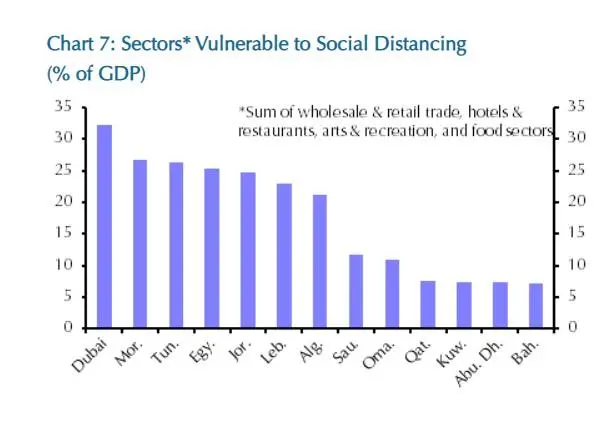PHOTO
An escalation of virus outbreaks across the MENA region over the coming weeks and months would prompt a tightening of restrictions, leading to even greater challenges to economic recovery than anticipated, according to a new assessment of the state of COVID-19,
Independent economic research firm Capital Economics noted that the crisis could ultimately leave very deep economic scars. Recent data have already shown that unemployment in Egypt has increased, and a survey by Dubai’s Chamber of Commerce showed over 75 percent of travel and tourism firms could go out of business by the end of the year.
The Gulf had been the epicentre of the coronavirus outbreak in the region having accounted for around 80 percent of new cases between April and mid-July. Thanks to the quick response from authorities who imposed strict lockdowns as well as large-scale testing, which resulted in reduced number of new daily cases since the start of July.
However, cases in the UAE have begun to increase over the past few weeks to their highest levels since mid-July. The authorities have already warned that, if things continue to deteriorate, they may reimpose the national curfew and sterilisation programs.
James Swanston, MENA Economist at Capital Economics, said: "Dubai is the most vulnerable economy in the region to social distancing measures, travel bans and lockdowns and, as we warned in a Focus earlier this year, there is a real risk that the crisis triggers renewed debt problems in the Emirate."


Image source: Capital Economics
Though there were concerns in Egypt that the easing of lockdown had come too early as daily new case numbers surged in late-May and early-June, since then the number of new daily cases has fallen from an average of nearly 1,500 to less than 200.
Although governments across the Gulf states have largely managed to control coronavirus outbreaks, Morocco, Tunisia, Jordan and Lebanon have seen the virus spread rapidly in recent weeks. “These economies are the most vulnerable in the region to a fresh tightening of containment measures, and recoveries could prove to be even weaker than we are currently anticipating,” Swanston said.
"In Lebanon, the large-scale injuries and deaths resulting from the Beirut blast at the port earlier this month have put further strains on an already-stretched healthcare system, prompting the authorities to impose a partial lockdown and overnight curfews," he added.
(Writing by Seban Scaria; editing by Daniel Luiz)
Disclaimer: This article is provided for informational purposes only. The content does not provide tax, legal or investment advice or opinion regarding the suitability, value or profitability of any particular security, portfolio or investment strategy. Read our full disclaimer policy here.
© ZAWYA 2020





















